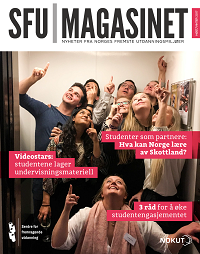bioCEED applies for funding from FINNUT
The Research Council of Norways FINNUT programme announced NOK 72 million in funding for Researcher Projects on and for the educational sector with a deadline 22nd Nov.
bioCEED submitted two proposals for research projects within our focus areas.
The proposal ENIGMA: The hidden structures and processes promoting and hindering educational transformation is led from Bergen, with partners from University of Minnesota and Centre for Engineering Education at Lund University.
ENIGMA will investigate on the relationships such as how teacher affects and practice evolves. What is the role of policies and action plans, collegiality and culture, and incentives (represented by pedagogical merit systems) in shaping teaching practice? And, how do each of these measures impact teachers, local microcultures, and institutional commitment to educational quality?
Our working hypothesis is that to achieve radical and lasting change, we need to impact not only individuals and their affects and actions, but also the collegiality and institutional culture. ENIGMA will use multi-faceted theoretical frameworks and methods to explore this ongoing transformation. We will explore the characteristics of different change agents and levels in HigherED, from individual teachers and students via collegial microcultures to institutions and agencies, and study development of cultures that embrace evidence-based teaching and value teaching as a part of faculty members’ scientific identity. We will assess impacts on teaching and learning, teacher and student affects and communities of practice and identify barriers to transformation. ENIGMA offers new ideas and approaches to educational transformation of international interest and impact.
The proposal FARE: Educational value of combining Field work and Authentic Research Experiences will be led from UNIS, with partners from University of Otago, New Zealand, University of Minnesota and Department of Education, University of Bergen.
Linking authentic research-based experiences and field work has a huge learning potential, including discipline knowledge and skills, transferable skills and key competences identified as important for future challenges, like critical thinking and problem-solving. However, we lack knowledge on important success criteria to optimize and assess these learning activities and realize their full potential for learning outcomes. The University Centre in Svalbard (UNIS) offers a unique possibility to investigate how intersection between research experiences and field work influences learning. Most courses at UNIS have a field component, and students are frequently involved in authentic research activities like student-driven research projects or contribution to staff research. Using UNIS as model system, FARE will investigate links between authentic research experiences and field work at several levels of complexity and with different methodology, including both quantitative and qualitative methods. FARE aims to describe the added value of these links, and identify important success criteria to optimize and assess these learning activities and realize their full potential in relation to the desired learning outcomes, cost-benefit evaluations and research benefits for the institution and lecturer.



